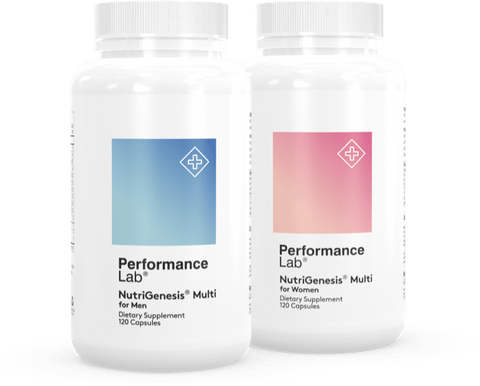Serving as both an essential fat-soluble vitamin and a powerful antioxidant, vitamin A is critical for maintaining overall health. It is essential for skin health and vision and is also needed for preventing chronic disease, supporting immunity, and promoting bone health.
A vitamin D can cause several unwelcome consequences, ranging from poor night vision and dry skin to stunted growth and weakened immunity. But striking the right balance of vitamin A is essential, as too much of this supplement isn’t good.
But apart from the mentioned benefits, some suggest vitamin A could promote weight loss. While it’s by no means marketed as a weight loss supplement, it’s more of an indirect contributor by providing cellular support to organs that can help improve metabolic function and fat loss.
So, we’re breaking down the link and giving you all the details on the importance of vitamin A and why it could help you lose a few pounds.
Let’s get started.
What Is Vitamin A?
Vitamin A is a collective term for a group of fat-soluble compounds essential for optimal health. It is a vitamin and a powerful antioxidant that plays critical roles in several biological functions, including vision, immunity, skin health, neurological function, and more.
And as with all antioxidants, it’s also involved in reducing inflammation via its ability to fight free radicals.
But people don’t know that fat-soluble vitamins can travel through fat and are stored inside body fat or organs 1. And unlike water-soluble vitamins, they can also penetrate cells and elicit their actions.
You’ll find vitamin A in one of three forms in the human body: retinol, retinal, and retinoic acid 2. Plant and animal-derived whole foods will provide two different forms of vitamin A—beta-carotene (found in plant foods) and the active vitamin A, also called retinol (found in certain animal foods).
It’s essential from pre-birth to adulthood. While retinol is a critical component of the diet, many of vitamin A’s essential functions aren’t carried out by retinol but rather by its active metabolites. These functions include 3:
- Epithelial integrity and function
- Skin cell regeneration
- Mucus production
- Supporting barrier function
- Healthy immune responses
- Growth and development
- Reproduction
- Vision
But what is vitamin A good for? Studies have shown that antioxidants like vitamin A are important in maintaining good health and longevity.
Still, they also benefit eye health and vision, immunity, cell growth and proliferation, and more.
So, let’s explore some of vitamin A’s health benefits.
7 Health Benefits Of Vitamin A
1. Supports eye health and vision
If you’ve heard about vitamin A, chances are it’s in relation to eye health—one of its most well-known benefits. That’s because 11-cis retinal is an essential component of rhodopsin, a G-protein coupled receptor found in the highest concentrations in rod cells of the retina 4.
Here, it functions as the primary photoreceptor molecule of vision. When light shines on the retina, it activates rhodopsin and transmits a signal to the brain that results in vision.
A 2001 study published in the Archives of Ophthalmology found that people at high risk for developed age-related macular degeneration (AMD) who took a multivitamin daily that included vitamin A, vitamin C, vitamin E, zinc, and copper had a 25% lower risk of advanced macular degeneration during six years 5.
2. Enhances immunity
As an essential vitamin and antioxidant, vitamin A is critical to immune health and may be beneficial for fending off illness and infection.
According to a review published in Clinical Infectious Diseases, a vitamin A deficiency could weaken immune defenses and alter the function of immune cells 6.
Some research suggests that a deficiency inhibits the regeneration of mucosal barriers, which increases the passage of infectious agents and increases susceptibility to illnesses 7.
3. Reduces inflammation
Inflammation is at the heart of many chronic diseases, so a diet high in antioxidants and anti-inflammatories is incredibly beneficial.
Beta-carotene has powerful antioxidant properties that help mitigate free radical accumulation and prevent oxidative damage to cells, which reduces inflammation. The anti-inflammatory effects of vitamin A and beta-carotene can have far-reaching impacts on virtually all body systems.
They can help reduce the risk of cardiovascular diseases, diabetes, Alzheimer’s, and Parkinson’s, and improve inflammatory conditions like rheumatoid arthritis and Crohn’s disease 8.
4. Get glowing skin
Vitamin A is the golden remedy for glowing skin—it can help fight acne, reduce wrinkles, and boost overall skin health. A 2007 study found that topically applying retinol to the skin improved fine lines and wrinkles and increased the skin’s ability to withstand injury 9.
And thanks to its anti-inflammatory properties, it may also help treat a wide range of skin conditions, such as psoriasis, eczema, and acne 10-12.
5. Supports bone health
Most of us are familiar with calcium and vitamin D for bone health, but did you know vitamin A is just as important? Excess and deficiency of vitamin A can compromise bone health 13.
A 2006 study published in Bone found that plasma retinol levels were drastically lower in older women with osteoporosis than those without, suggesting that low retinol levels may be linked with reduced bone mineral density 14.
6. Reduces cholesterol
Cholesterol is a fat-like substance found throughout the body that plays several important roles—it’s needed for hormone synthesis, cell membrane formation, vitamin D production, and bile—but too much cholesterol can lead to buildups in blood vessels, increasing the risk of heart disease and cardiovascular issues.
While studies are limited, some research suggests that increasing your intake of vitamin A may naturally reduce cholesterol levels. One animal study found that beta-carotene supplementation for six weeks significantly reduced total blood cholesterol 15.
7. Promotes tissue repair
Have a wound that needs repairing? Vitamin C is essential for tissue repair, but vitamin A is also necessary for tissue repair and cell regeneration.
A 2006 study published in Dermatologic Surgery found that pretreatment with retinoids improved wound healing in patients undergoing facial resurfacing procedures 16.
This may be because of its ability to stimulate epidermal turnover, increase the rate of re-epithelialization, and restore epithelial structure 17.
Does Vitamin A Promote Weight Loss?
There is no shortage of benefits linked to vitamin A, but how does it stack up regarding weight loss?
While vitamin A may not play a direct role in weight loss, it comes with a long list of other benefits that enhance overall health, making it a solid addition to your diet if optimal health is what you want.
And although few people know much about vitamin C, it’s evolved from a fat-soluble vitamin that benefits the eyes to attain a para-/autocrine hormone status 18. Besides its well-known roles, vitamin A has also been implicated in many other physiological processes.
New research suggests that adipose tissue is an active endocrine organ with a tendency for growth throughout life. Excess energy accumulates in adipose tissue, leading to obesity and other weight-related complications like type 2 diabetes, hypertension, and cardiovascular disease.
However, new studies suggest that vitamin A metabolites like retinaldehyde and retinoic acid are somehow involved in regulating adipose tissue metabolism and may play a role in weight management and obesity.
On top of that, another study published in Molecular Metabolism found that vitamin A stimulates a fat-burning process called “browning”–the conversion of white fat tissue into brown fat tissue 19; brown fat, which makes up less than 10% of body fat, burns energy and generates heat, thereby helping to increase core body temperature, especially in the cold.
One study subjected humans and rodents to moderately cold temperatures and looked at their serum vitamin A levels, finding that cold exposure stimulated redistribution of vitamin A from the liver (its storage site) towards fatty tissue, where they observed browning and saw a higher rate of fat burning.
So, while vitamin A may not be the be-all for fat burning, a deficiency does lead to weight gain, suggesting that it plays some role in weight management and weight loss.
And although it’s still unclear how vitamin A gets to the location to trigger fat burning, new research does suggest it enters fat cells to stimulate fat burning, which may support weight loss and help fight obesity.
Best Sources Of Vitamin A
Increasing your intake of vitamin A-rich foods is the ideal way to reap the benefits of vitamin A, and if you’re looking for what to eat, here are your best options:
- Winter squash (butternut, buttercup, kabocha)
- Sweet potato, yam
- Kale
- Carrots
- Beef liver
- Spinach
- Broccoli
- Egg yolks
- Butter
- Dried apricots
But on top of loading up on vitamin A-rich foods, supplementation is another avenue for increasing your intake—but you don’t want to go crazy.
In Performance Lab NutriGenesis Multi, you get 100% RDI of 17+ essential vitamins and minerals for optimal health.

And with Performance Lab’s own NutriGenesis technology, they’re bioidentical nutrients designed for maximum absorption and bioactivities to ensure that what you’re taking can be used.
References
- Mora JR, Iwata M, von Andrian UH. Vitamin effects on the immune system: vitamins A and D take centre stage. Nat Rev Immunol. 2008;8(9):685-698.
- O’Byrne SM, Blaner WS. Retinol and retinyl esters: biochemistry and physiology. J Lipid Res. 2013;54(7):1731-1743.
- Gilbert C. What is vitamin A and why do we need it?Community Eye Health. 2013;26(84):65.
- Lenahan C, Sanghavi R, Huang L, Zhang JH. Rhodopsin: A Potential Biomarker for Neurodegenerative Diseases. Front Neurosci. 2020;14:326.
- Age-Related Eye Disease Study Research Group. A randomized, placebo-controlled, clinical trial of high-dose supplementation with vitamins C and E, beta carotene, and zinc for age-related macular degeneration and vision loss: AREDS report no. 8 . Arch Ophthalmol. 2001;119(10):1417-1436.
- Semba RD. Vitamin A, immunity, and infection. Clin Infect Dis. 1994;19(3):489-499.
- Stephensen CB. Vitamin A, infection, and immune function. Annu Rev Nutr. 2001;21:167-192.
- Hunter P. The inflammation theory of disease. The growing realization that chronic inflammation is crucial in many diseases opens new avenues for treatment. EMBO Rep. 2012;13(11):968-970.
- Kafi R, Kwak HS, Schumacher WE, et al. Improvement of naturally aged skin with vitamin A (retinol). Arch Dermatol. 2007;143(5):606-612.
- Kuenzli S, Saurat JH. Retinoids for the treatment of psoriasis: outlook for the future. Curr Opin Investig Drugs. 2001;2(5):625-630.
- Schmied C, Piletta PA, Saurat JH. Treatment of eczema with a mixture of triamcinolone acetonide and retinoic acid: a double-blind study. Dermatology. 1993;187(4):263-267.
- Chivot M. Retinoid therapy for acne. A comparative review. Am J Clin Dermatol. 2005;6(1):13-19.
- Ahmadieh H, Arabi A. Vitamins and bone health: beyond calcium and vitamin D. Nutr Rev. 2011;69(10):584-598.
- Maggio D, Polidori MC, Barabani M, et al. Low levels of carotenoids and retinol in involutional osteoporosis. 2006;38(2):244-248.
- Silva LS, de Miranda AM, de Brito Magalhães CL, Dos Santos RC, Pedrosa ML, Silva ME. Diet supplementation with beta-carotene improves the serum lipid profile in rats fed a cholesterol-enriched diet. J Physiol Biochem. 2013;69(4):811-820.
- Abdelmalek M, Spencer J. Retinoids and wound healing. Dermatol Surg. 2006;32(10):1219-1230.
- Polcz ME, Barbul A. The Role of Vitamin A in Wound Healing. Nutr Clin Pract. 2019;34(5):695-700.
- Jeyakumar SM, Vajreswari A. Vitamin A as a key regulator of obesity & its associated disorders: Evidences from an obese rat model. Indian J Med Res. 2015;141(3):275-284.
- Fenzl A, Kulterer OC, Spirk K, et al. Intact vitamin A transport is critical for cold-mediated adipose tissue browning and thermogenesis. Mol Metab. 2020;42:101088.
















